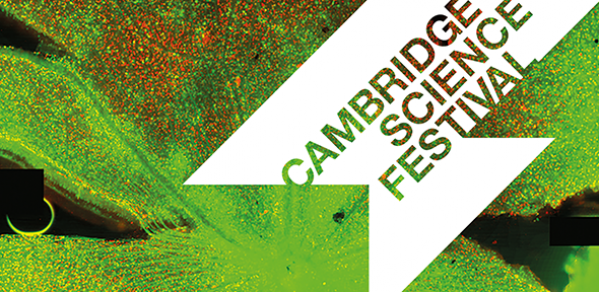
Demonstrations of bio-inspired robotics, laser lab tours, and an introduction to the world of self-healing concrete, are among the engineering topics being explored during the 26th Cambridge Science Festival, running from 9-22 March.
PLEASE NOTE: THE SCIENCE FESTIVAL HAS BEEN CANCELLED.
As part of the Festival, the Department of Engineering will open its doors to the public on Saturday 14 March, 10am-4pm, for a bumper day of interactive activities and informative talks:
- 9.30am-10.30am – Postdocs from the EPSRC-funded Resilient Materials 4 Life (RM4L) research team introduce you to intelligent construction materials and how they can shape the future of infrastructure. Booking required.
- 10.30am-11.15am | 11.15am-12noon | 12noon-12.45pm – Build an electronic sensor with an Arduino micro-controller. Booking required.
- 10.45am-11.45am | 12.30pm-1.30pm – Investigate the science of ice cream.
- 11am-12noon – Dr Shery Huang, Lecturer in Bioengineering, gives an overview of how 3D printing technologies could transform the way implants are produced, drugs are screened or perhaps even how damaged organs are ‘repaired’. Booking required.
- 11.15am-12.15pm – Dr Alexandre Kabla, Reader in Mechanics of Biological Materials, discusses the simple rules that can lead to rich and complex behaviours that shape natural objects such as flowers and fingerprints. Booking required.
- 12.45pm-1.45pm – Professor Janet Lees shares everything you should know about concrete, the most widely used human-made material in the world. Booking required.
- 1pm-2pm – Did you know the world’s first underground farm is in London? Dr Ruchi Choudhary, Reader in Architectural Engineering, shares the opportunities and challenges of this new way of farming. Booking required.
- 1pm-4pm – Join researchers from the Cambridge Centre for Smart Infrastructure and Construction (CSIC) and the Laing O’Rourke Centre for Construction Engineering and Technology for hands-on demonstrations of Microsoft HoloLens, and acoustic sensing and fibre optic sensing. Discover how they use technology to make our infrastructure ‘smart’.
- 2.15pm-3.15pm – Nanotechnology is a new science that has already touched our lives. Dr Colm Durkan, Reader in Nanoscale Engineering, looks at real life examples of how it is used. Booking required.
- 2.30pm-3.30pm – The future of energy in a climate changing world will be discussed by Professor Simone Hochgreb. Booking required.
- 2.45pm-3.45pm – Dr Claire Barlow looks at the big picture around the environmental consequences of using plastics for packaging and examines the alternatives. Booking required.
- All day – Learn civil engineering concepts the fun way with four themed games.
- All day – Kite making, all welcome.
There will also be an open day on the West Cambridge site at the Institute for Manufacturing (IfM), part of the Department of Engineering, on Saturday 21 March, 1pm-5pm:
- 1pm-5pm – Learn all about the good, the bad and the downright scary of information in the digital age.
- 1pm-5pm – Get a glimpse of the latest laser technologies and find out how they are used in industry with the laser lab tours.
- 1pm-5pm – Fire your laser at the IfM’s tin can alley; Enjoy some LEGO building; Get involved in a microscope workshop; Immerse yourself in virtual reality.
- 1pm-5pm – Have your group selfie etched onto steel using one of the IfM's high-powered laser markers.
- 1.30pm-2.30pm | 3.30pm-4.30pm – Professor Tim Minshall shows how things are made. Learn about the role of robots and how they are good at some tasks but can never be as good as humans.
- 1.30pm-4.30pm – See how construction is going digital at the Centre for Digital Built Britain (CDBB) by harnessing the power of robots, artificial intelligence, machine learning and new technologies.
- 2pm-4pm – Graduate engineering students take on the challenge of sharing their research with you in just 6 minutes 40 seconds using the Pecha Kucha presentation method.
Growing underground
On Thursday 12 March, 6pm-7pm, at Mill Lane Lecture Rooms, Dr Ruchi Choudhary, Reader in Architectural Engineering, presents the environmental monitoring and modelling of the world’s first underground farm in London, located in tunnels designed as a WW2 air raid shelters in the 1940s. Booking required.
Shaping healthcare issues with emerging innovations
On Tuesday 17 March, 7.30pm-9pm, at Mill Lane Lecture Rooms, Cassi Henderson, PhD student at the IfM and the Department of Chemical Engineering and Biotechnology, shares her research interest in the development of accessible and appropriate technologies to improve human health. Her focus is on the design of robust systems for point-of-care medical diagnostics for use in resource-limited settings. Booking required.
Bio-inspired robotics
On Thursday 19 March, 3.30pm-5pm, at the Department of Engineering, join researchers from Dr Fumiya Iida's Bio-inspired Robotics Laboratory in the new Observatory for Human-Machine Collaboration for demonstrations of their bio-inspired robots.
Innovative drones for environmental and agricultural monitoring
On Thursday 19 March, 5pm-6pm, at the Department of Engineering, Roland Siegwart, Professor of Autonomous Systems at ETH Zurich, will discuss the impact and problems for addressing the global challenges of technological development. Booking required.
More puzzling surprises
On Friday 20 March, 6pm-7pm, at the Babbage Lecture Theatre (New Museums Site), Dr Hugh Hunt, Reader in Engineering Dynamics and Vibration, and maths presenter Rob Eastaway return with another collection of puzzling curiosities linked to familiar everyday objects. Booking required.
Engineering cycling excellence
On Saturday 21 March, 3.30pm-4.30pm, at the Cavendish Laboratory, Department of Physics, Professor Tony Purnell explains how improved technology and an engineering approach have helped to improve speed and lower records in cycling. Booking required.

